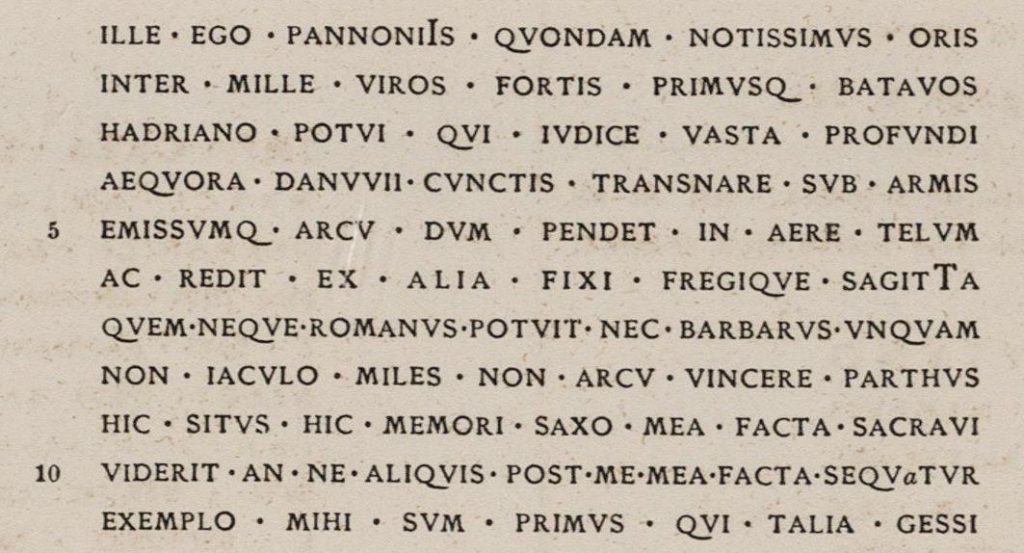Super Swimmer Shoots Arrow Down September 8, 2017
Author: Beach Combing | in : Ancient , trackbackHere is a remarkable feat of arms recorded as a poem on an inscription, put up in AD 118 on the banks of the Danube by a Roman soldier, Soranus. Given that this is a public statement of the feat, we can assume that it actually happened.
This is I, once the best known of the Pannonian shores and the first and strongest among one thousand Batavi [serving with Rome]. I managed – let Hadrian tell you how – to swim across the wide waters of the Danube with all my equipment, and while a shot from a bow hung up in the air and fell, I hit it with my arrow and snapped it, I the one that no Roman or Barbarian was ever able to outperform. Here it happened, here I have put down my deeds in memory in stone. Let’s see if anyone can do better after me. I am an example to myself; the first who managed such a thing.
Ille ego Pannoniis quondam notissimus oris inter mille viros fortis primusq(ue) Batavos Hadriano potui qui iudice vasta profundi aequora Danuvii cunctis transnare sub armise missumq(ue) arcu dum pendet in aere telum ac redit ex alia fixi fregique sagittaquem neque Romanus potuit nec barbarus unquam non iaculo miles non arcu vincere Parthus hic situs hic memori saxo mea facta sacra vividerit an ne aliquis post me mea facta sequ[a]tur exemplo mihi sum primus qui talia gessi!
The Batavians were a Germanic people who were brought into the Roman forces for their swimming abilities and their creative thugishness. Here our hero was swimming across the river and shot at an arrow in flight with his own bow and hit and broke the flying arrow. He perhaps justifiably felt that this deserved some celebration and Beach particularly loved exemplo mihi sum, ‘I’m an example to myself’. CIL III, i, 3676. The problem is how the hell did he do it? If we are to believe the text, as we must, he had his full Roman armour on and was swimming across the river, when he took out his bow, notched an arrow – he was on his back? – and then shot at the arrow flying above. This just doesn’t seem possible. It has been suggested that he was on horseback, and that he was either swimming side by side with his horse or was on his horse: the Batavians were famous for crossing deep rivers with their mounts. At that point perhaps this all becomes a little easier to understand. The other question is whether the arrow just happened to be there (were they under attack?) and Soranus thought that he’d take a shot, or he accidentally hit the arrow. Or was this a competition? For example, fifty Batavians set off swimming, while the Emperor Hadrian watched, then the Batavians shot the arrows at an arrow that had been shot above their heads. Surely, the first is more likely. Thoughts? drbeachcoming AT yahoo DOT com
Speidel suggested that Soranus belonged to the equites singulares Augusti, the Emperor’s elite horse archers who were known as the ‘Batavi’ because they fought in the Batavian fashion. In fact, it is possible that, as Spiedel notes, Soranus was not ethnically Batavian at all: though note the first line.
Stephen D, 29 Sep 2017: Fascinating, but I’m not sure the text really means that the heroic Batavian shot an arrow to hit another one in flight while swimming the Danube in full kit. Either would be remarkable, to do both at once even more so. But if Soranus had done both at once, would there not have been some phrase in the inscription emphasising that extraordinary feat: ‘simul et semel’ or words to that effect? And he says ‘mea facta’ which is surely plural: my deeds, not ‘meum factum’, my deed.
Soranus is a good Latin name, meaning a native of Sora, in Lazio, in the province of Frosinone. Not eminently Batavian. Under Augustus there was the legio IV Sorana, mostly enrolled there. No obvious connection.
There were, probably among others, eminent bearers of the name:
Soranus of Ephesus, eminent physician in the reign of Hadrian, author of On Acute and Chronic Diseases. I think nothing to do with our man.
Quintus Valerius Solanus, tribune of the people, executed 82 BC under Sulla, allegedly for having revealed the secret name of Rome. Doubtful.
Quintus Marcius Barea Soranus, consul 34 AD, proconsul of Africa 41-43, father of Quintus Marcius Barea Soranus, consul 52 AD, suicide 66 under Nero; and of the more fortunate Quintus Marcius Barea Sura, father-in-law of Vespasian’s son Titus, and hence grandfather of Trajan, who was of course Hadrian’s adoptive father. Getting close here, I think: could a genuine Batavian, getting Roman citizenship (or at least wanting a Roman identity) have chosen a name highly acceptable to Hadrian?



